Matthew 25
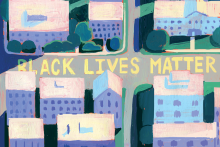
AS WE COME to the end of the Christian liturgical year to enter Advent, these reflections are more on the character of God than on our human responsibilities to live into God’s reign. They evoke a sense of God’s care for God’s people as a continual reality from generation to generation.
What does it mean to reflect on the ways God has been with our ancestors and bring that reflection into our trust for God? How do we hold ourselves accountable to our history while reaching toward God’s future? If we believe that we are participants in the reconciliation of the world to wholeness, to God’s first and best intentions, then we will have to recommit ourselves to the promises we made to serve God.
It’s not always easy because there are so many other things, other “gods” if you will, to pull us away. The hymn writer confessed that he was “prone to wander, Lord I feel it.” Haven’t we all felt the inclination to leave the God of our ancestors, of our confession, of our hope? I certainly have. As we meditate over the texts for this month, I hope we also will reconsider our relationship with God and with one another. I hope we will be encouraged as we decide when and how to act as a part of our faith. The world needs us to be reflective and active in these times. God is calling us forward.
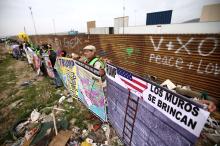
President Trump, I personally invite you to also come down to the borderlands with me in Tijuana and San Diego and meet the people directly impacted by the stroke of your pen. I am a co-founding director of Global Immersion, and one of our primary organizational initiatives involves having cross-sector leaders from around the country come to the border to see the human face of immigration and build a set of tools for how to better care of the “stranger among us,” as my sacred text (the Bible) mandates.
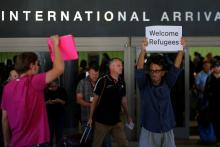
The U.S. State Department announced that it will drastically cut down the number of refugee resettlement offices across the country since the Trump administration's plans to sharply reduce refugee admissions into the U.S., according to a Reuters report.
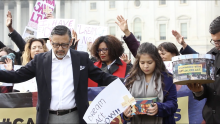
As Congress faces a Friday deadline to fund the government, some Senate Democrats are considering blocking the spending bill unless Republicans agree to a bipartisan Dream Act, which would grant conditional residency to immigrants who arrived in the U.S. as children and meet several other requirements. The Trump administration ended the Obama-era executive program, Deferred Action for Childhood Arrivals, in September, putting the decision to protect the 800,000 immigrants under the program in the hands of Congress. To encourage their lawmakers, many Dreamers and supporters are bringing the dreams of those awaiting a clean Dream Act straight to the Capitol.

OVER THE PAST several months, Republicans in Congress tried time after time to make good on their seven-year threat to “repeal and replace” the Affordable Care Act. Each time a wide variety of groups stepped up to protect the vulnerable and ensure that millions of Americans continue to receive the health care they deserve. At several critical junctures, Christians played an important role.
This summer, for instance, a clear witness against health-care repeal was brought together by the Circle of Protection, a coalition of Christians we help convene who have come together around the biblical mandate to protect poor and vulnerable people. All the families of our faith—the National Association of Evangelicals and the National Council of Churches, the Catholic Church and the Salvation Army, and most of our denominations—came together to say: We may differ on many things, but we are joining to protect the people Christ has called us to protect. The group urged political leaders to pursue “options that do not ask our poorest neighbors to bear most of the weight of budget and health-care cuts.”
Back in July, on the very day a repeal vote was scheduled, about 20 of us showed up outside the Senate chamber door in response to a request from a senator. We were from many different traditions and denominations—Catholic, evangelical, Protestant, black churches, Latino churches—and we started praying outside the door.
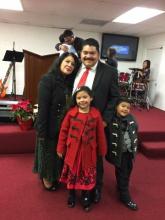
They handcuffed me and searched me, and another officer said that they were taking me to the detention center in Adelanto. I had heard a lot about that detention center, but I never imagined how terrible that place actually is. I had a very bad experience there. I had a cold during the first few days of being there and I was not receiving any kind of medical attention.

Seeing this cooperative work leaves me with a deep sense of awe for how humanity can come together. Local communities worked together even before any national or international aid agencies set up shelters. They created plans and networks, and even used Twitter to rescue strangers stranded on roofs. While my heart breaks for the lives lost and interrupted, I see all the ways God is knitting us together through these local responses.
But also, right now, ACT for America, a major anti-Muslim hate group, is meeting in Washington, D.C. Groups like ACT for America aim to marginalize and block whole groups of people from our nation’s religious and community fabric. Both ACT for America and the founder, Brigitte Gabriel, have a long history of promoting policies at the federal and state levels that are intended to manufacture fear of Muslims and promote the false idea of Muslims as a threat to the United States.

We thank you for thousands of sisters and brothers
Who seek education, who love this good land.
For they are a blessing to us and to others;
May we reach to offer a welcoming hand.

“It is preposterous to claim that justice for immigrants isn’t central to Catholic teaching,” wrote Rogers. “It comes directly from Jesus Himself in Matthew 25, ‘For I was hungry and you gave me food … a stranger and you welcomed me.’ Immigrants and refugees are precisely the strangers we must welcome. This isn’t Catholic partisanship. The Bible is clear: welcoming immigrants is indispensable to our faith.”

There was nothing for me to do in that moment but recognize that her humanity and my humanity are made to see each other, feel each other, embrace each other. There were no dividing lines or political views or religious dogmas to get in the way. There were simply two families grieving with one another that the world is not always as it should be.

We are living in a time of unprecedented economic disparity between the rich and the poor, the haves and the have-nots. Masses live in poverty so that a handful of people can live as they wish. The world’s three richest people own more than the combined economies of 48 countries. The average CEO in the US is making 400 times the average worker.

It is the tragedy of Christianity that the first hate crime in our constellation of texts is Matthew’s, in his telling the story of the passion. Jesus was a great teacher, an inspiring healer, and a man whose radical compassion touched everyone — women without honor, under-employed fisher folk, Roman soldiers, gentiles, Samaritans, scholarly Pharisees. The hearts of Palestinian Jews flocked to him, and this terrified the Romans. They tried to abort his movement by making his death a spectacle of cruelty and unutterable degradation.
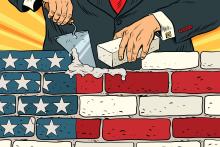
Christians who refuse to break rank from their political tribes and social circles at the expense of refugees, immigrants, the sick, the poor, the uneducated, the maligned, and the outcast are prioritizing carnal hopes rather than divine promises.
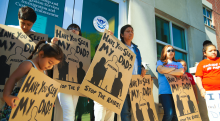
The growing momentum behind the Matthew 25 Pledge has reminded me of my old friend and mentor, Mary Glover, who helped me understand the deepest meaning of that Gospel text. She was not a theologian or formal biblical commentator, but she showed and taught me the meaning of this Scripture more than four decades ago. Matthew 25 brought me to Christ out of the student movements of my time and led me to help begin Sojourners. We moved into one of the poorest parts of Washington, D.C., in the neighborhood where Mrs. Glover lived.
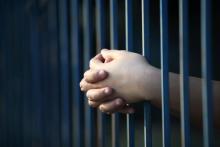
While they told Moses that, “All the words that the Lord has spoken we will do” (Exodus 24:3), in the end they turned to idols and broke God’s laws. By the time we get to First Samuel, we hear the people clamoring for an earthly king so they could be like other nations (1 Samuel 8:4-22). They thought life would be better if they shook up their system of government, so they ditched the judges and looked for an outsider. In the end, they got exactly what they asked for – a king named Saul who was wicked and moody and paranoid.

We are calling upon Christians and other people of faith to act on their faith commitment to racial justice. Volunteers will be needed all across the country to ensure that vulnerable voters know their rights, have a way to get to the polls, and even have non-violent protection in order to have the opportunity to express their constitutional right to vote. Sojourners is working with other nonpartisan groups, in partnership with lawyers and others, in training people of faith to take these very appropriate — and necessary — steps to protect these Matthew 25 voters.

As a pastor in a historically black church, Quinn Chapel A.M.E. Church in Jefferson City, and the Executive Director of Missouri Faith Voices, a PICO federation, I say this attempt to silence and disenfranchise voters is contrary to the gospel of Jesus Christ. When I interpret Matthew 25, it is not merely about providing food, clothes, and hospitality — it is about transforming systems that have caused people to be left out.

We must remove the veil that separates the least of these and count it not robbery to give them their legal, spiritual, and constitutional right to move beyond acts of mercy, but to build power for social change. As we begin to build prudent bridges, we break the sacred-secular divide and crippling covenants the silence us. We must renounce the manifesto placed upon our communities, schools, neighborhoods that allows the rich to reap where they have not sown. We must embrace our right to vote not only as a civil right, but a Godly right. We can no longer impose predatory measures upon ourselves; we have to remove the cloak of suppression.
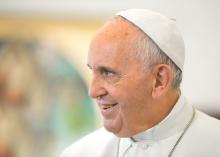
Days after creating a stir by saying that Donald Trump “is not Christian” because of his harsh views on immigrants, Pope Francis again took up the theme of “fake” Christians in his homily at Mass the morning of Feb. 23. Referring to the readings of the day from Isaiah and from the Gospel of Matthew, in which Jesus warns of the judgement that awaits those who do not practice what they preach, Francis said Christians must act on their beliefs and care for the neediest — the hungry, the thirsty, and those in prison.

Pope Francis has called “unbridled capitalism” the “dung of the devil” and criticized it for doing little to help the poor.